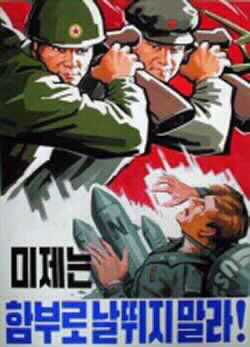A Russian envoy held six hours of talks Monday with reclusive North Korean leader Kim Jong-il and described the meeting on the nuclear standoff between Pyongyang and Washington as substantive and successful. Russian Deputy Foreign Minister Alexander Losyukov emerged from the talks at a heavily guarded residence on the northern outskirts of Pyongyang to describe them as successful, but gave no details, said Russia's Itar-Tass news agency, one of the few foreign news agencies with a permanent correspondent in secretive North Korea .
"The meeting was very substantive. The atmosphere was very warm," Losyukov said as he left to return to the Russian embassy.
It was the first sign of a possible breakthrough in an impasse that began in October when Washington said the North had admitted to a secret nuclear weapons program. Pyongyang later kicked out U.N. nuclear inspectors, removed the seals from a mothballed reactor and pulled out of a global treaty preventing the spread of atomic arms.
Losyukov has presented Pyongyang with a set of three proposals that call for the Korean peninsula to be nuclear-free in exchange for guarantees of the North's security and for the resumption of economic and humanitarian aid to the impoverished communist state.
He was believed to have given Kim, leader of the world's only communist dynasty, a message from President Vladimir Putin , Itar-Tass said. Russia is one of the few countries to maintain close ties with Pyongyang. Kim has visited Russia twice in recent years and Putin has made three trips to Pyongyang.
The Russian envoy, the first foreign diplomat to meet Kim since the crisis began, was due to return to Beijing on Tuesday.
U.S. officials have cited some progress in easing the nuclear crisis, the latest indication that Washington has moved away from its hard line of "no talks" by ditching a policy of refusing to reward bad behavior by the North now that the standoff has become a distraction from efforts to disarm Iraq.
A senior North Korean diplomat tried to play down fears of conflict on the divided peninsula by saying the North had no wish to harm South Korea although it would regard any U.S. move to impose sanctions as a declaration of war.
KNEE-TO-KNEE MEETING
Losyukov's trip is part of a flurry of diplomatic initiatives.
U.S. Undersecretary of State John Bolton was in Beijing for what he said would be "a long day of consultations" with Pyongyang's closest ally. He is due in Seoul Tuesday.
Seoul said it would use meetings this week with Red Cross officials and cabinet ministers of North Korea to press Pyongyang to end the nuclear impasse.
"The South Korean government will deliver the international community's concerns over the North's nuclear crisis to the North Korean government and try to be more active on this matter," said a statement from the presidential Blue House.
North Korea has insisted that the United States, which a year ago bracketed the North together with Iraq and Iran in an "axis of evil," is key to resolving the standoff.
"The nuclear problem on the Korean peninsula was created by the United States and must be wholly resolved with us and the United States sitting knee-to-knee," the Korean Central News Agency (KCNA) quoted one official as telling Losyukov.
North Korea has said it will talk only to the United States, and then only on certain conditions. The United States has moved away from its original refusal to talk but wants the North to dismantle its nuclear program.
"NO ATTACK ON SOUTH"
In an apparent bid to drive a wedge between South Korea and the U.S. troops who have guarded it since the 1950-53 Korean War, Pyongyang's consul-general in Hong Kong told a newspaper that North Korea had no intention to attack the South.
"If the United States attacks us, we'll only go after our enemy," the Chinese-language Ming Pao daily quoted the diplomat, Ri To Sop, as saying.
"We and South Korea are of the same lineage and the same country, we share the same language and culture. There's no reason for us to harm our relationship with South Korea," he said, but repeated Pyongyang's threat to declare war if the United States imposed sanctions.
"We are ready to go to war, and war has no mercy," he said, but stressed: "We will not mix South Korea up with the United States."
The North has 11,000 artillery pieces trained toward Seoul across the most heavily fortified frontier on earth.
Secretary of State Colin Powell dismissed suggestions of war and rejected comparisons of the administration's approach to North Korea with its effort to force Iraq to disarm.
"We don't have a cookie cutter policy for every situation," Powell said on CNN.
Washington is searching for a diplomatic solution to persuade Pyongyang to abandon its suspected nuclear-weapons program, but has threatened Iraq with war if it fails to cooperate with U.N. weapons inspectors.
Powell, who will attend Monday a Security Council counter-terrorism meeting, said he hoped the U.N. body would formally take up the North Korea issue in the "not-too-distant future."
He said President Bush believed a diplomatic solution was possible. "I think we are seeing some progress with respect to the work we are doing with our friends in the region."
PHOTO CAPTION
The North Korea Central News Agency released posters depicting North Korea's military power on Jan. 20, 2003. The letters read, 'U.S. imperialists shouldn't carelessly provoke war.' (Korean News Service/Reuters)
- Author:
Reuters - Section:
WORLD HEADLINES


 Home
Home Discover Islam
Discover Islam Quran Recitations
Quran Recitations Lectures
Lectures
 Fatwa
Fatwa Articles
Articles Fiqh
Fiqh E-Books
E-Books Boys & Girls
Boys & Girls  Hajj Rulings
Hajj Rulings Hajj Fatwas
Hajj Fatwas














